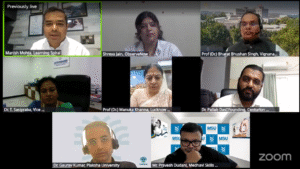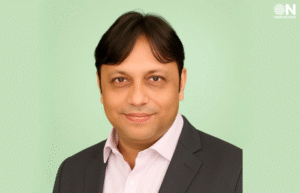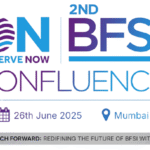India’s Educational Ascendance – A Step Towards Global Eminence

The globalization of education presents Indian students with both promising opportunities for academic advancement and intricate challenges stemming from geographical distance. Yet, the internalization of education offers a wealth of possibilities, notably through international collaborations such as dual degree programs, research initiatives, and the cross-cultural integration of courses. One of the recent developments, Mumbai University joined hands with French university for a dual degree programme.
Moreover, globalization provides students with unprecedented access to a diverse array of learning opportunities, transcending the constraints of geography and cultural differences. Through the proliferation of online education platforms and digital technologies, students can now readily enroll in courses offered by universities worldwide, exposing them to a wide spectrum of academic disciplines and educational methodologies. Additionally, study abroad programs afford students the chance to fully immerse themselves in diverse cultures, languages, and academic traditions, fostering not only personal development but also intercultural competency.
The digital era catalyzed by globalization has further democratized access to educational resources, making them more readily available than ever before.
India’s position in the global education arena
The implementation of internationalization initiatives in the National Education Policy (NEP) has prompted IITs to expand their presence beyond borders. Notably, IIT Delhi and IIT Madras have established overseas campuses in Abu Dhabi and Zanzibar, respectively. The ongoing aggressive development in the Indian educational arena is going to place India at a much higher position on the global education map.
 ObserveNow Media interacted with Sanjay Kumar Bahl, Vice Chancellor, Indus International University on the globalization of HEIs and its possible impact on the Indian education system. He stated that “India had been known as a knowledge domain for 5000 years. Taxila and Nalanda are a few examples. Aashrams of Rishi Muni’s had been excellent examples of Centers of Excellence. Other than IITs many private universities have set up their overseas Campuses. As Indians would be 150 Cr. in 750Cr world population, they would be dominating with their ethics, humble behavior, English proficiency, knowledge of Sanskrit, yoga, ayurveda, Naturopathy, Astrology, and courses like engineering, medicine, defense, economics, commerce and management would be Indian educational strength world over.”
ObserveNow Media interacted with Sanjay Kumar Bahl, Vice Chancellor, Indus International University on the globalization of HEIs and its possible impact on the Indian education system. He stated that “India had been known as a knowledge domain for 5000 years. Taxila and Nalanda are a few examples. Aashrams of Rishi Muni’s had been excellent examples of Centers of Excellence. Other than IITs many private universities have set up their overseas Campuses. As Indians would be 150 Cr. in 750Cr world population, they would be dominating with their ethics, humble behavior, English proficiency, knowledge of Sanskrit, yoga, ayurveda, Naturopathy, Astrology, and courses like engineering, medicine, defense, economics, commerce and management would be Indian educational strength world over.”
Highlighting the traditional rich history of the Indian education landscape, he further elucidated that “The human honest work of Indian teachers will always be above everyone in the world’s educational system. We have a vision to make Chanakya, Aaryabhat, C. V. Raman, APJ Abdul Kalam from the youth through scientific innovation, vision, motivation, and practical approach. Indian system of education has to be spread for the benefit of mankind, peace in the world, and the progress of humanity.”
The vision of peace, progress, and prosperity in the world can only be brought by the Indian system of education which through every subject teaches sacrifice in deeds, respect for all – living & nonliving, and peace for all. Education is not a means for living but it is a way for human existence on earth. We have to change the selection in universities with the best of dedicated, devoted, and disciplined cadres. New sciences, and subjects to be identified bring good food and good thoughts to students to make earth smile every day without conflicts and protection of environment.
The Indian Education Ecosystem Accelerating Internationalization
Expanding the reach of Indian institutions by internationalizing their advanced programs in quantum technology, data science, cyber-physical systems, and similar fields could have a transformative impact, similar to the success experienced by countries like Australia.
Kumar expressed his thoughts on the possible factors that can accelerate the internalization fo the Indian education ecosystem and said, “ The acceleration of Indian educational ecosystem can be brought with the clear and focused approach by all the stakeholders – Students, teachers, parents, government, industry, employers, and everyone in society.”
In crafting a comprehensive strategy for societal transformation, it’s imperative to consider a multitude of factors. First and foremost are the dreams harbored by individuals, representing aspirations for change and evolution within our world. It is crucial, not only to understand their essence but also to envision the tangible benefits they can bring to society upon realization. However, mere visualization is insufficient without concrete action. Action research and meticulous planning are essential steps towards translating dreams into reality. This process demands a deep understanding of the resources required, the human capital needed, and the imperative to harmonize progress with the preservation of our environment.
Flexibility is a cornerstone of this endeavor, embracing the diversity of perspectives and fostering a culture where every voice is heard. In the spirit of Vasudhaiva Kutumbakam, the global community is viewed as one family, necessitating democratic processes and an openness to alternative ideas. Sincere efforts must underpin every action, driven by a genuine commitment to the betterment of humanity.
Central to this transformative journey is the role of facilitator rather than dictator. Recognizing the rich heritage of the Indian knowledge system, we acknowledge its potential to guide us toward becoming Vishv Guru once more. Despite a historical hiatus, technology can expedite our reclamation of this mantle, provided we harness its potential wisely. By integrating these factors seamlessly, we pave the way for a future where innovation, compassion, and sustainability converge to propel humanity towards its highest aspirations.
To hear more from Sanjay Kumar Bahl, Vice Chancellor, Indus International University, Register for the 6th Edition of the ObserveNow Education Leaders Conclave & Awards.
















